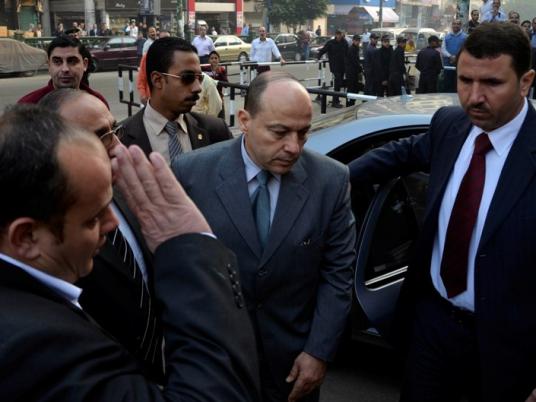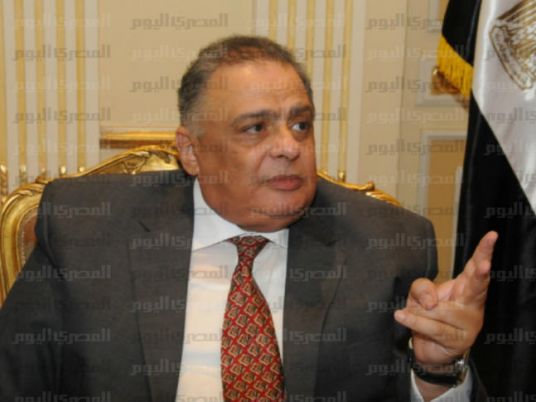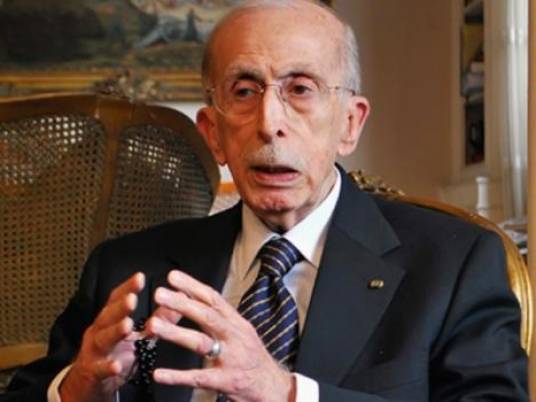
After days of upheaval following President Mohamed Morsy’s constitutional declaration, his spokesperson Yasser Ali justified the move late Monday by saying the decree was mandated by the revolution.
As secular forces prepared to take to the streets Tuesday to demand a complete retraction of what they dubbed as a “dictatorial” set of decrees, Ali assured that the president would not rescind the declaration since he is responsible for achieving revolutionary demands.
The declaration introduced a Revolution Protection Law, which Morsy claimed would guarantee the rights of the 25 January martyrs and injured revolutionaries as well as ensure retrials for former regime officials accused of killing protesters.
Wrapped in a cluster of articles giving Morsy unprecedented, expansive power by immunizing his decrees and laws from appeal or annulment, the supposed law is also criticized for making retrials contingent on presenting new evidence and for including pitfalls that threaten freedoms.
Article 4 of the law has particularly outraged rights lawyers, who say it is a “catastrophe.”
The article lists six chapters from the Penal Code as charges that would be referred to the newly established prosecution and specialized courts, including insulting the president, a public employee, a judge or obstructing traffic, says Heba Morayef, the Egypt director of Human Rights Watch.
It merely cites the numbers of the penal code chapters without delving into any details, and while promising to guarantee retribution for the martyrs, it subtly harbors an article that flagrantly violates freedom of expression.
“These laws were used by the former regime to prosecute the opposition,” Morayef says.
The law allows the prosecutor general to detain anyone accused of these crimes for six months without a court order, which paves the way for muzzling activists and opposition figures who may be brought to account for openly criticizing the president.
“This so-called Revolution Protection Law is tyrannical and grants the prosecutor general the same jurisdiction as the infamous state security, which attempted to eliminate the opposition during Mubarak’s reign,” Ahmed Ragheb, lawyer and executive director of the Hisham Mubarak Law Center, says.
Martyrs’ rights
Many believe the law was presented as a way of appeasing public outrage that was bound to be riled up over Morsy’s takeover of sweeping powers. Any mention of martyr’s rights, which has consistently been one of the top demands of the revolution, ensures the acquiescence of some political and social forces.
The reality from a legal perspective is quite different, however, and some of the martyrs’ families believe they are being exploited by Morsy.
“The Muslim Brotherhood and even secular powers use us when they need to make political gains. It happened during the parliamentary elections and it’s happening now,” says Mostafa Ramadan, whose brother Mahmoud Hassan Ramadan was killed on 28 January 2011.
Ibrahim Khodeir, brother of martyr Rahma who also fell on 28 January, shared the same sentiment.
“My sister and the rest of the martyrs died so Egypt can unite in the face of tyranny … but now Morsy is using them to separate the country and achieve personal gains,” he says. “I don’t want this Morsy declaration that will burn the country to ashes.”
Supporters and opponents of Morsy have clashed in governorates around Egypt following the 22 November declaration, most fiercely in Damanhour where Islam Fathy, 15, was killed on Sunday.
State radio reported that more than 440 people have been injured as a result of the sporadic outbursts of violence.
Ramadan and Khodeir are skeptical that the law would ultimately bring about justice, but still, some martyrs’ families have hope that Morsy’s decisions may lead to long-delayed retribution.
“I completely support the president’s announcement. Now the truth will come out and those responsible for killing our children will be prosecuted,” says Raafat Zeinhom, father of martyr Islam, 17, another victim of 28 January 2011.
Transitional justice
According to Article 1 of the declaration, fresh investigations into the killing of protesters and the use of violence would be conducted, and pending new evidence, former regime officials may be retried.
The law itself is criticized for being vague and for failing to detail the mechanisms through which new evidence will be obtained.
“We need an explanation from the presidency on how this law will be implemented. How do they expect to find new evidence?” Ramadan asks.
Digging up new evidence will prove to be a difficult task, according to legal and rights experts, namely since almost two years have passed since nearly 850 people were killed and thousands injured during the 18-day revolt that toppled Hosni Mubarak.
It is also largely believed that much of the evidence was destroyed swiftly after the uprising by the people that would be accused.
Further, the prosecution will depend on the same laws to gather new evidence, which entail methods already deemed as flawed.
Cases related to the 25 January revolt were mainly based on evidence provided, or some say, withheld, by Interior Ministry officials as well as the testimonies of the defendants’ colleagues, according to lawyers. The result was a number of weak cases in which most of those accused of killing protesters were acquitted.
The Revolution Protection Law penalizes withholding information or evidence that may achieve justice and retribution for the martyrs and injured, in addition to cases of political and financial corruption involving former regime figures.
Ragheb, however, argues that this already exists in the Penal Code and that stressing this point in the new law would have the adverse effect of “keeping police officials from presenting previously withheld evidence out of fear that this alone could indict them.”
No evidence incriminating police forces will ever emerge, he says, until and unless the Interior Ministry is reformed and purged of corruption.
In August, Ragheb presented a draft transitional justice law to the president’s office, detailing the mechanism by which to try those involved in the killing of protesters without violating their right to a free trial.
However, the proposal was shelved and never saw the light of day, he says.
The draft law presented a model for transitional justice that complies with local and international laws, guaranteeing the defendants’ right to a lawyer, a public trial and the right to appeal. It stipulated that former regime officials be prosecuted for corruptions and violations during the 30 years of Mubarak’s reign, not just the 25 January revolution.
“This is supposed to be revolutionary justice. People who were tortured and unlawfully detained and killed under the former regime also deserve retribution,” Ragheb says.
Exceptional measures?
In an interview with independent daily Al-Shorouk, Mohamed Mahsoub, minister of legal and parliamentary affairs, says Morsy’s law does not introduce “revolutionary courts” with exceptional judicial measures.
“You are not creating a court, you are creating a district within the same court system which will specialize in these proceedings,” he says.
He cited the similar creation of economic courts, which were hindered by the same drawbacks in the existing system. An exceptional judiciary is when a court is established to specialize in matters not presently handled by judicial authorities.
Egypt’s constitutional precedent allows for the establishment of exceptional courts, according to Article 4 of the International Human Rights Charter, in times of instability to ensure the protection of the people, he adds.
In Ragheb’s proposed law, he suggests the establishment of an independent authority to receive complaints, gather evidence and investigate abuses committed by the former regime against the people, including murder, torture, illegal detention, and squandering and stealing public funds.
The independent authority would include current and former judges and public figures who did not hold executive posts in Mubarak’s regime and have no reputation of being loyal to him.
This point guarantees the integrity of the investigative authority and its neutrality, according to Ragheb, and its members can be appointed by the elected president or prime minister.
Former Prosecutor General Abdel Meguid Mahmoud was considered a holdover from the Mubarak regime, and his removal has been a frequent demand of protests. Morsy’s first attempt to remove Mahmoud by appointing him as the ambassador to the Vatican was decried by judiciary powers, who rejected interference in their affairs.
While this last constitutional declaration removes Mahmoud for good, judges are still crying foul and the battle between the judiciary and the presidency has intensified.
Mahmoud was replaced with Talaat Abdallah, who some say is one of the prominent members of the judicial independence movement. Abdallah spoke out against the flagrant rigging and violations of the 2005 parliamentary elections.
Others accuse him of being a close associate of the Brotherhood.
Morayef says Abdallah will face challenges when it comes to the prosecution system in Egypt, which mainly relies on police forces to investigate and gather evidence — in these cases, against their superiors and colleagues.
“By having an independent investigative authority, you can bypass a lot of the mechanisms followed by the prosecution that might obstruct investigations,” she explains.
The specialized prosecution and courts established under Morsy’s law are still closely tied to the prosecutor general and follow the same methods in gathering evidence. While they would consist of prosecutors and judges, Morsy’s decree doesn’t specify how members would be appointed.
Morayef points out that specialized prosecutions and courts designated for cases related to the revolution would guarantee swift, thorough trials and prevent them from being lost in the shuffle of other court cases.
The extended transition
Article 1 of the Revolution Protection Law refers to incidents that occurred during the revolution, which typically refers to the 18-day uprising that toppled Mubarak and brought the military council into power. It does not, however, necessarily include investigations into the ensuing aggression by security and military forces against protesters in the months that followed.
Morayef says that since the article doesn’t specify a timeframe, it may extend to crimes committed during the transitional period under the Supreme Council of the Armed Forces.
Ragheb says the period the law covers remains vague.
The SCAF and security forces repeatedly came under fire for attacking protesters and forcibly dispersing demonstrations and sit-ins on a regular basis, from the time they came to power until after Morsy’s presidency, when he reclaimed full authority in mid-August 2011 with his first constitutional declaration.
The most violent clashes between military forces and protesters took place on 9 October 2011 at Maspero, during the Mohamed Mahmoud clashes that began on 19 November of last year, and during the Cabinet clashes of December 2011.
Only the Military Prosecution has the jurisdiction to prosecute military officers or refer their cases to military or civilian courts, and the constitutional declaration does not change this, Morayef says.
Ragheb says he called on Morsy to issue a decree allowing the prosecution of military officers and officials in specialized courts, rather than military courts.
Some say Morsy intentionally left the SCAF out of the scope of the law in order to guarantee their loyalty and support, amid the fury of secular powers demanding the annulment of the constitutional declaration and the fall of Morsy.


